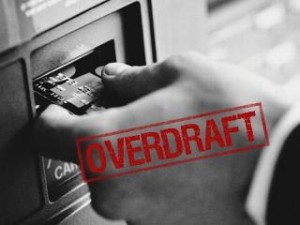 Your bank may offer you a ‘convenient’ overdraft service, allowing transactions to go through even though you don’t have enough money in your account. Trouble is, you’re going to be hit with overdraft fees after the fact, and a single fee can be $25 or more. If you unknowingly make several transactions on an overdrawn account throughout the day, those fees will add up fast. So what can you do to avoid this mess?
Your bank may offer you a ‘convenient’ overdraft service, allowing transactions to go through even though you don’t have enough money in your account. Trouble is, you’re going to be hit with overdraft fees after the fact, and a single fee can be $25 or more. If you unknowingly make several transactions on an overdrawn account throughout the day, those fees will add up fast. So what can you do to avoid this mess?
Check your bank account balances online regularly–for example, every payday, or every Friday.
Don’t trust the balance you see on the ATM receipts, as it may not be an accurate reflection of the money available in your account. For example, it may count cheques or cash you just deposited, but if your bank holds those items for a few business days, you won’t actually have access to those funds.
Try your best to keep at least $100 in your account and don’t dip below that number unless you absolutely must.
Ask your bank if you can set up a text or email alert that will warn you when your balance goes below a certain number.
Don’t write cheques.
Unlike online transactions, you can never be sure when the cheque will be deposited, and if you’ve forgotten about cheques you’ve written a while ago that suddenly get deposited, you may get a nasty surprise if the funds aren’t there to cover them.
Pay for overdraft protection. If you know you’re often running short in your account and aren’t keen on checking your balance regularly, it’s probably worth it to pay an annual overdraft protection fee of $10 to $50 and have your bank use funds from your credit card, line of credit, or savings account when your checking account bottoms out.
